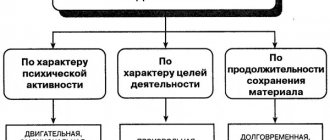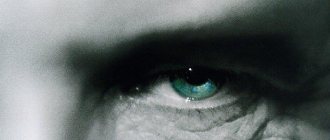But you can easily arrive in a great mood
There were different stages in my life, and there was a stage when I could not buy what I wanted. I went shopping and felt somehow deprived. Of the huge abundance of goodies, I couldn’t afford anything. Then I started avoiding stores. Every time I looked at the shop windows, I got angry. I was angry that I couldn't afford it. This anger was accompanied by feelings of inferiority and self-doubt. Everything inside was shrinking, and the mood was mostly depressed. And then I have... Personal psychology Personality and individual processes Mood Emotion management Negative Self-confidence
Repressing Trauma
Freud originally had the idea that neurosis developed as a result of trauma
in childhood, primarily as a result of
sexual seduction
.
Freud heard many revelations from his hysterical patients about seduction by their fathers or other relatives - so much that he doubted that it was all true. As a result, Freud also doubted the theory of trauma
and came to the conclusion that his patients themselves had a sexual desire towards their caregivers, which they embodied in a fantasy, but because these fantasies caused anxiety and shame, they were
repressed
, and It was only through analysis that we remembered them as real memories from childhood. (Perhaps everything was exactly like this, see more about this.)
“The mention of protection from irritations immediately brings to mind that repressions arise in two different situations, namely: when an unacceptable attraction is awakened due to external
perception and when it arises
from within
without this kind of provocation from without.” (Freud. “Inhibition, symptom, anxiety”)
Freud used the concept of repression
, first of all, when it came to things that cause anxiety.
Later, when Freud spoke about mental experiences trying to penetrate consciousness from the unconscious
, he meant precisely
internal experiences
, one might say,
isolated from reality
, and not mental experiences
of real traumas
.
In his fundamental work “Inhibition, Symptom, Anxiety,” Freud introduced the concept of signal anxiety
, meaning precisely the dangers that threaten from within, from
the Id
.
Today psychologists and psychoanalysts use the term repression
and in the case of painful memories and experiences associated with
childhood
trauma For example, a patient assures a psychoanalyst that his childhood was ordinary, there was nothing remarkable about it, and in the process of analysis he recalls details that would have happened
.
If we look closely at the history of the development of little Hans' phobia, we will see that it had a traumatic
origin:
In the presence of his father, he could not sleep with his mother, and when
the mother wanted to take Hans to bed,
the father started screaming
.
It is a very controversial question to what extent a child can be allowed to “infiltrate” the parents’ bedroom. Obviously, a mother should not replace her husband with a son, otherwise it will be an easy Oedipal victory
will deprive the boy of an incentive to develop (see).
But if, in the struggle for oedipal advantage, the father raises a cry
of neurosis
in the boy
is quite likely Especially if a mother seduces her son when she herself wants to take him to bed. A seductive mother
and
a menacing but loving father
cause a soul-tearing
conflict
, which naturally leads to neurosis (as in the story of Freud’s own childhood, see).
Repression as a phenomenon
In psychology, repression is a mechanism of mental defense that is associated with the elimination of certain information from consciousness.
At the beginning of the 20th century, this phenomenon was discovered by Sigmund Freud; it is one of the important discoveries in psychoanalysis and one of its key concepts. In life, repression is understood as the spontaneous forgetting of any information that, from a rational point of view, seems unimportant, but has valuable psychological meaning. Forgetting affects not only individual moments, for example, dates, names, faces, but also extends to events and long periods of time.
Note 1
In a broad sense, repression is considered a basic and universal mental process, since it is it that underlies the formation of a separate area of the psyche - the unconscious.
Finished works on a similar topic
- Course work Defense mechanism: repression 420 rub.
- Abstract Defense mechanism: repression 280 rub.
- Test work Defense mechanism: repression 240 rub.
Receive completed work or specialist advice on your educational project Find out the cost
Throughout life, those impulses and drives that are repressed from consciousness and cease to be recognized influence the formation of the personality’s character, its emotional reactions and experiences.
Repression is an elementary defense of one’s own “I”. At the very beginning of life, the psyche of every person begins to use repression; as they grow older, they return to this defense at moments when more flexible and complex methods of defense are unavailable or do not work at all.
This protective mechanism becomes the basic way of responding to internal conflicts. This leads to the development of an altered or dissociative (in this case, repression can cover the entire personality as a whole) personality type. If the volume and quantity of repressed material turns out to be destructive for the individual and causes pathological changes, then significant areas of memories of long periods of time are also repressed. For example, memories of physical abuse in childhood are subject to large-scale repression. As a result, post-traumatic personality disorder develops.
Have questions about this topic? Ask a question to the teacher and get an answer in 15 minutes! Ask a Question
To use repression in relation to emotions, the psyche must be sufficiently developed, and also have a sense of the integrity of one’s own “I”. An example of repression in a healthy person is the temporary forgetting in a conversation of the name of a person for whom there are pleasant, unpleasant or inappropriate feelings. In the psyche of children, aggressive fantasies towards their parents are usually repressed. Thus, elements of emotional life that come into conflict with others are often subject to repression (repression): hatred, the desire to harm, as well as desires that contradict moral and ethical standards, etc.
Psychoanalysts have found that the thought of something, having been repressed into unconscious images and ideas, continues to be active within the psyche, trying to return to consciousness. The result is a dynamic process that expends human energy to complete an insoluble task. A person does not completely get rid of desires by repressing them, but only loads the brain with the work of keeping desires in the unconscious.
This hateful depression or help yourself
“The sky was overcast with clouds, which seemed to obscure the sun with an impenetrable wall. Hiding from people in my cramped and stuffy little world, hour by hour it became more and more painful and unbearable. From spiritual loneliness and melancholy I wanted to howl at the moon. Everything that previously brought pleasure and joy irritated and enraged me. Self-pity has reached a crisis boiling point. It seemed that life had lost its meaning or had stopped altogether...” So it would be quite possible to describe one of millions of similar ones... Practical psychology Psychological practice Depression Exit Medicines Remedies
Story
Sigmund Freud
Neurologist Jean-Martin Charcot was the first to study hysteria as a psychological disorder in the late 19th century. Sigmund Freud, Joseph Breuer and Pierre Janet continued the research on hysteria begun by Charcot. These three psychologists determined that hysteria was an intense emotional reaction to some form of serious psychological distress and suggested that incest and other sexual traumas were the most likely cause of hysteria. The treatment agreed upon by Freud, Breuer and Pierre was called the talking cure.
and was a method of encouraging patients to recover and discuss their painful memories. During this time, Janet coined the term dissociation, which refers to the lack of integration between different memories. He used dissociation to describe the way in which traumatic memories are stored separately from other memories.
The idea of motivated forgetting originated with philosopher Friedrich Nietzsche in 1894. Nietzsche and Sigmund Freud had similar views on the idea of repressing memories as a form of self-preservation. Nietzsche wrote that a person must forget in order to move forward. He stated that this process is active because we forget specific events as a defense mechanism.
The publication of Freud's famous article "The Etiology of Hysteria" in 1896 sparked much debate on the topic of these traumatic memories. Freud argued that neuroses were caused by repressed sexual memories, which implied that incest and sexual abuse must be commonplace in upper- and middle-class Europe. The psychological community did not accept Freud's ideas, and years passed without further research on the topic.
It was during the First and Second World Wars that interest in memory disorders reignited. During this time, many cases of memory loss developed among war veterans, especially those who survived shell shock. Hypnosis and drugs became popular for treating hysteria during the war. The term post-traumatic stress disorder (PTSD) was coined following the emergence of similar cases of memory impairment in Korean War veterans. Forgetting or being unable to remember part of a traumatic event has been considered a key factor in the diagnosis of PTSD.
Anne Burgess and Linda Holmstrom studied trauma-related memory loss in rape victims in the 1970s. This is how a large number of stories related to childhood sexual abuse began. It took until 1980 to determine that memory loss due to all severe trauma was the same set of processes.
The False Memory Syndrome Foundation (FMSF) was created in 1992 in response to the large number of memories that were claimed to have been recovered. FMSF was created to counter the idea that memories can be recovered through certain methods; instead, its members believed that the "memories" were actually confabulations created by the inappropriate use of techniques such as hypnosis.
"Greetings from the unconscious"
Each of us has noticed that the situation that we are trying to forget often reminds us of itself again and again. There is a place for the repression mechanism here.
A person, using a defense mechanism, denies his inner impulses and thoughts. Impulses that have been repressed go into the subconscious, but despite this, they continue to influence lives, causing anxiety. Feelings and thoughts repressed by the psyche can still manifest themselves in the form of slips of the tongue or in a dream.
For example, the psyche can repress the experience of “war neuroses”, traumatic events, experienced feelings, and one’s behavior. A person may be tormented by flashbacks, unconscious memories, annoying or nightmares. In childhood, during the development of the Oedipus complex, the child suppresses sexual impulses towards one of the parents, he learns to repress forbidden desires into the unconscious.
It should be noted that an example of repression can be the speaker’s banal forgetting of the name of a person towards whom he experiences subconscious unpleasant feelings, etc.
Usually repression plays a positive role in a person’s life, but there are 3 manifestations of it when it is negative and creates problems:
- Does not fulfill its primary role of protecting repressed feelings, thoughts and memories.
- Prevents a person from moving towards positive changes.
- Interferes with the use of other coping mechanisms.
Structure of the 1C object “Plans of calculation types”
The plan of calculation types is a list of calculation types. Each type of calculation has a code, name and a set of details containing additional information about this type of calculation.
Calculation types can be created and edited:
- by the developer (predefined calculation types);
- by the user (while working with the application solution).
The user cannot delete calculation types created by the developer.
Calculation types created in a calculation type plan can influence each other. The system supports two types of such influence:
- dependence on the base period;
- preemption by validity period.
For each type of calculation, you can specify a list of calculation types on which it will depend for the base period, and which will supersede it according to the validity period (more details...).
Example
For example, the type of calculation “Alimony” may depend on the base period on such types of calculation as “Salary”, “Daily Tariff”, “Personal Additional Payment”, etc. And the “Salary” calculation type can be replaced by the “Absenteeism” calculation type:
[collapse]
In addition to these dependencies, the so-called leading types of calculation can be specified for a type of calculation - those on which it does not directly depend, but which can influence it through other types of calculations.
Notes
- Freud Z.
Repression (1915) //
Freud Z.
Psychology of the unconscious. - M.: Firma STD, 2006. - P. 79-110. - Janet Malcolm.
Psychoanalysis: The Impossible Profession. - 1988. - P. 15. - Freud Z.
Five lectures on psychoanalysis. - Penguin, 1995. - pp. 28-29. - Freud Z.
On the History of the Psycho-Analytic Movement. — 1914. - Freud S.
On Metapsychology. — P. 147, 184. - Freud S.
On Psychopathology. — P. 245. - Freud S.
On Psychopathology. — P. 245. - Freud S.
Five Lectures. - P. 35. - Fenichel O. (English)Russian.
The Psychoanalytic Theory of Neurosis. - London, 1946. - P. 153. - Lacan J.
The Four Fundamental Concepts of Psycho-Analysis. - 1994. - P. 176, 236, 251. - R. Skynner/J.
Cleese. Families and how to survive them. - 1993. - P. 36-37.
Definition of the word “Displacement” according to TSB:
Repression is a protective mechanism of the psyche, which consists of expelling from consciousness experiences that are unacceptable to the conscious “I” (Ego) - drives and impulses, as well as their derivatives - emotions, memories, etc. The concept of V. is one of the main ones in Psychoanalysis and beyond has no special psychological significance. What is repressed from consciousness is forgotten by the subject, but retains in the unconscious the inherent energy of attraction (cathexis of psychic energy). In an effort to return to consciousness, the repressed may become associated with other repressed material, forming psychological complexes. On the part of the Ego, constant expenditure of energy is required to maintain V. Violation of the dynamic balance when protective mechanisms - anticathexes - are weakened can lead to the return of the repressed: such cases are observed in diseases, intoxications (for example, alcoholic), as well as in sleep conditions. Direct V. associated with mental shock can lead to severe traumatic neuroses. incomplete or unsuccessful V. - to the formation of neurotic symptoms. On the contrary, complete dissolution, the disappearance of the repressed, occurs only in rare cases of complete sublimation. There is no consensus among psychoanalysts about V.’s place among other defense mechanisms. The initial idea of V. as the main and universal psychic mechanism is now giving way to the view that V. comes into effect only after other mechanisms (projection, isolation, reactive formation, and many others) do not work. Most modern psychoanalysts tend to consider fear as the cause of anxiety, with which the ego reacts in a situation of danger. The concept of V. was applied in the field of ethnology by B. Malinovsky (Great Britain). Lit.: Freud Z., Repression, in his book: Basic psychological theories in psychoanalysis, trans. from German, M. - P., 1923, p. 90-102. Malinowski V., Sex and repression in savage society, L., 1927. Freud A., The Ego and the mechanisms of defense, NY, 1946. Madison P., Freud's repression concept, "International Journal of Psycho-analysis", 1956, v. 37, pt. 1, p. 75-81. Brenner Ch., The nature and development of the concept of repression in Freud’s writings, “Psychoanalytic study of the Child”, 1957, v. 12. p. 19-46. D. N. Lyalikov.
Defense Mechanisms
Currently, more than 20 types of protection mechanisms are known. They are divided into primitive and secondary types of protection.
Primary defense mechanisms include those mechanisms that interact with one’s own “I” and the outside world. It has insufficient connection with the principle of reality and consideration of the separateness and permanence of objects located outside the “I”. Primitive defenses are the ways in which a child experiences the world.
Secondary defenses are more developed and mature; more often they work with internal boundaries - between the experiencing and observing parts of the “I”.
There are 8 main defense mechanisms that regulate 8 basic emotions. Some of the mechanisms stand out as unambiguous, others constitute a combination of several protection options that are similar in content. Next, let's look at the basic protection mechanisms in more detail:
Negation. This defense mechanism involves refusing existing troubles; it is the earliest way to cope with them. A person automatically responds to any trouble with a denial; the subconscious is controlled by conviction; if he does not admit it, then it did not happen. For a person whose main defense is denial, it is considered normal to insist that everything is good, everything is for the better, everything will transform. The ability to deny danger in emergency circumstances can be life-saving on an emotional level, so a person can take the most effective actions. Denial can lead to the opposite outcome, for example, an elderly person denies that his ability to drive a car has weakened, instead of refusing to drive, etc.
Projection. This defense mechanism involves attributing to another person thoughts, feelings and motives that are not characteristic of him. It serves basic empathy. No one can penetrate someone else's psyche; in order to understand the subjective world of another person, we must project our own experience. In large quantities, projection causes misunderstanding and damage to interpersonal relationships. Some may resent being misperceived; if they are imputed, for example, with envy, they may retaliate in kind.
Substitution (displacement). A defense mechanism redirects emotions or behavior from a natural object to another because its original direction is alarmingly hidden for some reason. For example, a man was scolded at work by his superiors; when he came home, he took his anger out on his wife, who, in turn, scolded the children, who beat the cat or dog. This is how substitution works.
Repression (repression, suppression)
The defense is one of the first to attract the attention of the psychoanalyst Freud. The point is that a person deliberately forgets or ignores something
Something is removed from consciousness or kept at a certain distance from it. The mechanism applies to everything related to experience, fantasies and desires.
Intellectualization. The mechanism acts with a higher level of isolation of affect from intellect. An intellectualist talks about feelings in such a way that the listener may not understand the real emotions. This defense mechanism usually keeps the normal overwhelm or presence of emotions at bay.
Reactive education. Defense involves transforming negative affect into positive and vice versa. The human body is capable of turning something in the opposite direction and minimizing the threat. For example, the transformation of hatred into love, affection into contempt, etc.
Compensation. The mechanism manifests itself in attempts to find a replacement for a real shortcoming or defect with another quality through fantasizing or assigning to oneself the qualities, properties, and advantages of another person. This happens when it is necessary to avoid conflict with a specific person in order to increase self-sufficiency.
Regression. The mechanism refers to simple defenses that are familiar to every parent who has observed how their child shows his emotions when hungry, tired or sleepy. This process is unconscious, for example, people react to the stress caused by age-related changes in such a way that they get sick.
Repression - definition of the concept
Repression in psychology is one of the psychological defense mechanisms in which the human psyche represses or removes situations that cause negative experiences. Traumatic events or factors seem to be erased from memory. This process is otherwise called repression or suppression.
When repressed, the psyche mobilizes all its forces and directs them to forget information that causes negative emotions. This data is transferred from consciousness to the subconscious. They do not disappear completely, but are simply blocked for a certain period of time.
The German scientist Johann Herbart (beginning of the last century) spoke about repression for the first time. According to him, this process develops as a result of the conflict of contradictory ideas. Later, thanks to Freud, repression began to be considered a psychological defense mechanism.
What is repression?
The concept of “repression” was introduced by Sigmund Freud. This term refers to psychological defense for the purpose of active forgetting. It is as if some event or factor that causes sharply negative unpleasant experiences in a person is erased from human memory.
In other terms, repression is defined as:
- Repression.
- Suppression.
The essence of repression is that the psyche directs forces to forget the information that causes pain and strong feelings, transferring it to the subconscious part. Since the brain cannot completely forget the information received by it, it can only transfer it from the conscious sphere to the subconscious.
This is done so that the human psyche reaches its balance, since in the presence of certain thoughts or memories the individual experiences deep and strong experiences, emotions, and suffering. It should be recalled that repression is just one way to eliminate negative information from memory. One person will experience repression, while another will experience another form of defense, such as fixation.
Mechanism of action of psychological defense
Crowding out. Sometimes this concept is replaced by the term “motivated forgetting,” in which memories of tragic events transfer from consciousness to the subconscious. However, such a process does not at all indicate that the existing problem has been completely solved. It should be noted that quite often this type of psychological defense becomes the foundation for the development of all other mechanisms.
Regression. Hysterical and childish people always try to use it to avoid responsibility for making important decisions in their lives. Psychiatrists, in some particularly severe cases, consider regression fertile ground for the development of schizophrenia.
Projection. Few of us like to see our own shortcomings, but quite often a large number of unscrupulous people dig into other people’s dirty laundry. At the same time, the beam in their own eye does not bother them at all, because they are busy actively searching for the speck in it from those closest to them. In this exciting activity for them, they mask their hidden complexes by criticizing strangers.
Formation of reaction. Usually the voiced process is implemented in the form of a desire to compensate for one’s own, both imagined and existing shortcomings. At the same time, such people develop a vision of the world in black and white. In this case, you can position yourself as a strong person who, with a gentle nature, will try to crush everything around her, but not give in to weakness. Not because she is angry, but because she is afraid of the pain that might be caused to her. A weak personality, in turn, uses bravado as a psychological defense, hiding behind imaginary influential friends.
Negation. This phenomenon has much in common with the displacement of unpleasant or tragic events from consciousness. However, when in denial, a person not only forgets about what happened with motivation, but is also unlikely to remember what happened to him. If you tell him about the past, he will consider it a stupid invention of ill-wishers.
Substitution
In this case, a person will strive to shift his attention from more complex goals to solving easier problems. Such people rarely appear in places with increased danger, but visit establishments with a calm environment.
Sublimation
Adequate individuals direct unwanted impulses in the right direction. They are ready to relieve the same sexual, but unrealized tension through sports, tourism and active recreation. If there is no desire for such a positive release of energy, then we can talk about sadists and even maniacs. The sublimation mechanism quite often turns on precisely when there are intimate problems. However, in the absence of obvious deviations in the psyche, a person compensates for this deficiency with achievements in science, technology and art. Due to their high intelligence, such individuals block their unhealthy fantasies, sublimating them into fruitful activities that benefit society.
Rationalization. Quite often, the loser devalues the desired goal if the proposed enterprise fails. At the same time, he makes a spectacular pose when playing poorly, telling others that he didn’t really want to make the same career. Going to the other extreme, the voiced persons inflate the value of the prize received, although initially they did not really need it.
Identification. In some cases, people believe that they have the qualities of a lucky person they know. Being the antipode of projection, such identification implies the desire to mask one’s own inferiority in something by identifying with the achievements of a positive subject.
Insulation. Each of us has both positive character traits and negative manifestations of personality, because ideal people do not exist. When isolated, a person abstracts himself from his own unpleasant actions, not considering himself guilty of anything.
Fantasizing. Many people, being in a difficult financial situation, dream of finding a wallet full of dollars on the way somewhere. They also agree to purchase gold jewelry lost by someone. Over time, this form of defense against reality can become an obsession. If this does not happen, then no one is forbidden to fantasize.
Repression as a psychological defense
Repression is considered the main mechanism of mental defense when two functions are performed:
- Negative experiences are prevented by removing traumatic information from consciousness into the unconscious.
- Control and retention of traumatic information in the subconscious.
Examples of repression could be situations after physical or sexual violence, PTSD, military action, etc. However, information does not go away. Periodically, it pops up in the memory, a person may experience causeless anxiety, have nightmares, or not fall asleep for a long time.
On the one hand, repression is a way of adapting the psyche to environmental conditions. On the other hand, suppression prevents a person from developing, becoming stronger and more perfect, using his past experience in his present life, and also eliminating conflicts both within himself and in the outside world.
How the mechanism works
Psychoanalyst Sigmund Freud developed several theories regarding the process of repression in its various manifestations. Psychoanalysis examines 3 stages of this process:
- At the stage of primary repression, elements initially associated with the drive are eliminated from consciousness. From what is repressed, an unconscious “core of repression” is created, attracting other elements of the psyche that need to be repressed.
- Repression as the process of eliminating images and ideas from consciousness. This process also causes a tendency towards the return of already repressed information.
- The stage of return of the repressed is a process that manifests itself in the form of anxiety symptoms, dreams, and erroneous actions.
Note 2
The stages of the repression mechanism characterize defense in a broad sense. It should be noted that stage 2 is a dynamic process, and the stage 3 that follows does not replace it, but joins the process.
Sources
- https://avtorsvoejzhizni.ru/simptomy/vytesnenie-psihologicheskaya-zashhita-primery-vytesneniya.html
- https://www.SunHome.ru/psychology/podavlenie
- https://psyhosoma.com/vytesnenie-psixologicheskie-zashhity-po-frejdu/
- https://PsyTheater.com/vytesnenie.html
- https://spravochnick.ru/psihologiya/psihologicheskie_zaschity_i_zaschitnye_mehanizmy_v_psihologii/zaschitnyy_mehanizm_vytesnenie/
When problems arise
Repression becomes an obstacle to the full functioning of the psyche in the following cases:
- The defense mechanism does not do a good enough job of keeping disturbing thoughts, feelings, and emotions out of consciousness.
- Repression becomes a barrier to new experiences and does not allow a person to live life to the fullest.
- This problem is most typical for hysterical individuals; it entails difficulties in interpersonal relationships and social life.
The mechanism of repression is directly associated with the feeling of anxiety. Anxiety itself can cause an impulse to repression in order to get rid of the anxiety factor. However, it should be noted that repressed information provokes a feeling of vague, unexpressed anxiety in a person.
What problems does repression bring?
The repressed emotion, thought or desire is imprinted in unconscious images and continues to actively influence the psyche, trying to return to consciousness. As a result, this process takes a lot of energy from a person, since it is almost impossible to cope with the task assigned to the brain. When repressed, the following manifestations can be observed , which negatively affect the individual:
- information that causes anxiety is not retained well enough and breaks through in inappropriate situations;
- a person cannot get the experience he needs due to an internal prohibition;
- Interpersonal relationships and social life suffer as he develops hysterical traits.
In any case, repression is accompanied by an increase in the level of anxiety , although it is intended to protect the psyche from destructive influences.
If you are constantly faced with insoluble problems, you have vivid recurring dreams, you notice that impressive chunks have fallen out of your memory, be sure to seek advice from a psychologist online or in person.
These can all be signs of repression that is preventing you from living your life to the fullest and realizing your potential. Repression as a defense mechanism of the psyche
Theories
There are many theories related to the process of motivated forgetting.
Basic theory, theory of motivated forgetting
, suggests that people forget things because they either don't want to remember them or for some other specific reason. Painful and disturbing memories become unconscious and are very difficult to recall, but they still remain in the memory. Retrieval suppression is one way we can stop the retrieval of unpleasant memories through cognitive control. This theory was tested by Anderson and Green using a think/no-think paradigm.
Decay theory
is another theory of forgetting that refers to the loss of memory over time. When information enters memory, neurons fire. These memories are retained as long as the neurons remain active. Activation can be maintained through rehearsal or frequent recall. If activation is not maintained, the memory trace fades and fades. This usually occurs in short-term memory. Decay theory is a controversial topic among modern psychologists. Bahrick and Hall disagree with the decay theory. They argued that people could remember algebra they learned in school even years later. The refresher course brought their skills back to a high level relatively quickly. These findings suggest there may be more to the decay trace theory in human memory.
Another theory of motivated forgetting is the interference theory.
, which argues that subsequent learning can disrupt and impair a person's memories. This theory was tested by giving participants ten nonsense syllables. Some participants fell asleep after viewing the syllables, while others continued their day as usual. The results of this experiment showed that people who did not sleep were poor at remembering syllables, while participants who slept were better at remembering syllables. This could be due to the fact that sleeping subjects did not interfere during the experiment, while other subjects did. There are two types of interference; proactive intervention and feedback intervention. Proactive interference occurs when you are unable to learn a new task due to interference from an old task that has already been learned. A study was conducted to show that students who study similar subjects at the same time often experience interference. Retroactive interference occurs when you forget a previously learned task due to learning a new task.
The Gestalt theory of forgetting, originating from Gestalt psychology, suggests that memories are forgotten due to distortion. This is also called false memory syndrome. This theory states that when memories lack detail, other information is added to make the memory whole. This leads to incorrect memory recall.









